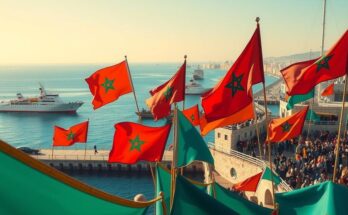Azerbaijan faces immense criticism for its human rights record as it prepares to host the UN climate talks in November, with calls from U.S. lawmakers and activists to address reported abuses against civil society and ethnic Armenians. A recent report highlights an escalating crackdown on dissent, exemplified by the arrest of notable human rights advocate Anar Mammadli. The situation calls for reform as the country’s claims of promoting climate justice contrast with its ongoing human rights violations and the precarious climate for activists.
Azerbaijan’s human rights situation is coming under significant scrutiny as the country prepares to host the UN climate talks in November. Human rights advocates and U.S. lawmakers are actively calling for an end to the reported abuses against civil society groups and ethnic Armenians. In a recent report by Human Rights Watch and Freedom Now, there are claims of an intensifying suppression of dissent, highlighted by the recent arrest of Anar Mammadli, a human rights advocate known for his work on climate justice issues. This report was released shortly after a coalition of U.S. lawmakers urged Secretary of State Antony Blinken to advocate for the release of political prisoners in Azerbaijan, which has garnered attention due to its position as a robust producer of oil and gas and its strategic location near Russia, Iran, and Armenia. The lawmakers emphasized the significant human rights violations reported in Azerbaijan, including arbitrary detentions and unlawful killings, particularly those related to the ethnic cleansing allegations in Nagorno-Karabakh, an area predominantly inhabited by Armenians. Amid these escalating tensions, U.S. lawmakers expressed that the forthcoming COP29 climate negotiations provide a crucial opportunity to bolster regional energy security and assist countries like Armenia in reducing their reliance on Russian natural gas. The broader implications underscore a global concern that state-led initiatives to combat climate change are being met with human rights violations that stifle grassroots advocacy and diminish the inclusion of impacted voices in policy discussions. Myrto Tilianaki, a senior advocate at Human Rights Watch, stated, “When civic space is actively shut down, the voices of those most affected by the climate crisis are at risk of being excluded from the negotiations.” The Azerbaijani Embassy in Washington refuted claims made by Human Rights Watch and Freedom Now, asserting the legitimacy of legal proceedings within the country. They condemned the allegations as part of an “orchestrated disinformation campaign,” claiming that Azerbaijan’s selection to host the climate talks exemplifies its commitment to international standards. The report details a pattern where the arrests of activists and media figures are linked to restrictive laws on non-government organizations (NGOs), suggesting that these actions are politically motivated. Many of those arrested faced charges related to smuggling and economic crimes, with the timing of these charges raising doubts about their legitimacy. Despite the global push towards reducing fossil fuel dependency as seen in previous climate conferences, Azerbaijan is poised to increase its gas production, which constitutes a significant portion of its national budget. President Ilham Aliyev remarked, “I have always said that having oil and gas deposits is not our fault. It is a gift from God. We must not be judged by that.” One prominent case spotlighted in the Human Rights Watch report pertains to economist Gubad Ibadoghlu, who was arrested on allegations including the production of counterfeit currency. Ibadoghlu has criticized the management of oil and gas revenues, asserting that the average citizen sees little benefit from these resources. Should he be convicted, he risks facing a 17-year prison sentence.
This article addresses the pressing human rights concerns in Azerbaijan as the nation gears up to host the 29th Conference of the Parties (COP29) to the United Nations Framework Convention on Climate Change. The backdrop of intensive scrutiny stems from allegations of serious human rights violations against various groups, particularly civil society and ethnic Armenians. With Azerbaijan’s strategic significance as an oil and gas supplier to Europe, ongoing human rights abuses have raised alarms among international lawmakers and watchdog organizations. The summoning of U.S. Secretary of State Antony Blinken to intervene heightens the urgency for addressing these challenges, bringing forth deeper implications about the intersection of environmental policy, energy security, and human rights protections.
In conclusion, Azerbaijan’s potential hosting of the UN climate conference reveals significant contradictions between environmental ambitions and ongoing human rights violations. The evident clampdown on dissent and civil society critics, overshadowed by strategic geopolitical interests, raises critical questions about the country’s commitment to addressing climate change and upholding human rights. With activists facing severe reprisals and accusations of political repression surfacing, the international community’s scrutiny and advocacy for positive change remain crucial as the global climate talks approach.
Original Source: www.wprl.org




